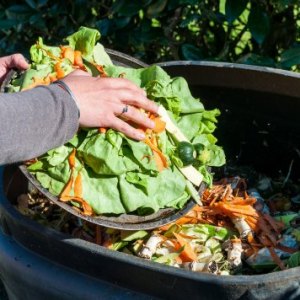
Try these simple ways to reduce food waste and reuse your food to make a lasting impact on the environment!
With the seemingly endless amount of food that we see at the grocery store, it is easy to toss something that just started to go bad and to replace it with a new and fresh version. However, a lot of the food that we toss can be used for quite a while longer after we think. With a little bit of creativity, you can save yourself money and multiple trips to the store by making smarter food choices.
How does food waste impact you and your family?
Did you know that food waste could be causing a major dent in your bottom line? Researchers estimate that the average family of 4 throws away $1,365 to $2,275 annually on food alone. That’s money that could be back in your pocket.
What are the environmental and societal costs of food waste?
- Energy, water, and fossil fuels that are required to grow harvest, transport, package, market, and sell food also get wasted. These resources are not renewable!
- Food decomposing in landfills is a significant source of methane emissions, a potent greenhouse gas that traps heat in the atmosphere.
- 40 percent of food produced in the U.S. is ending up in the trashcan. This is equivalent to:
- 141 trillion uneaten calories
- $165 billion lost
What can be done today to prevent and reduce food waste?
There are several easy habits you can adopt to reduce your own food waste, help the environment, and save some money. Here are 5 tips to get you started:
Purchase only what is needed.
- Plan meals ahead and use a shopping list. Get tips on healthy grocery shopping for your family!
- Avoid overdoing it on retail promotions like coupons, buy-one-get-one-free offers, and bulk discounts. Often with these promotions, you buy more than what you can use, or you buy foods that your family does not like so food gets tossed. Remember, it is not a bargain if it goes to waste!
Eat what you buy.
- Don’t prepare too much if you don’t plan to store it for a later meal.
- Eat leftovers and request doggie bags at restaurants.
- Learn proper preparation techniques and indicators of ripeness for fresh foods like produce. This helps maintain product integrity and allows you to get the most value for your dollar spent.
- The iPick Produce App available for iPhones is a great resource to check while you are in the market.
Keep food fresh.
- Learn to properly store foods so that they keep longer. Check out these guides on storing fruits and vegetables from UC Davis.
- Increase visibility in your refrigerator so that you do not lose track of what you buy. It can be easy to forget about foods pushed to the back or hidden away in a crisper drawer. Put foods that will soon spoil in direct sight so you remember to eat or freeze them for later.
Don’t toss food before it spoils.
- Food expiration dates, those “use by” and “best by” dates that you see stamped on both perishable and nonperishable products, are actually suggestions for peak quality. It is a common misconception that these are an indication of safe food, which may be better assessed by using your senses to check for off colors or smells. The exception is the “use by” date on infant formulas and eggs, which are regulated by the USDA and indicate when you should no longer consume the product.
- Confused about product dating? Check out the USDA thorough explanation.
- Try various preservation techniques to help cut down on food waste. Freezing, canning, pickling, and drying are all great methods to savor foods, and can even introduce some new ways to try fruits and vegetables.
Avoid the trash.
- Set a good example for your family by teaching them the value of food and explaining that they are lucky to have food on the table every day.
- Share or donate extra food before it spoils. Offer it to friends, co-workers, neighbors, or local food assistance or recovery programs in the community. People love free food, and unused groceries are no different.
- Compost food waste in the backyard or at local compost drop-off sites. Composting can help create nutrient-rich soil to grow new food and plants.
Decreasing food waste is just one way to save money, read Feed Your Family Fantastic Food for Less and Five Quick and Healthy Meals with Limited Time and Money for more savings!












